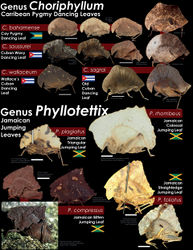Phyllotettix ( compressus ) foliatus
| Notice: | This page is derived from the original publication listed below, whose author(s) should always be credited. Further contributors may edit and improve the content of this page and, consequently, need to be credited as well (see page history). Any assessment of factual correctness requires a careful review of the original article as well as of subsequent contributions.
If you are uncertain whether your planned contribution is correct or not, we suggest that you use the associated discussion page instead of editing the page directly. This page should be cited as follows (rationale):
Citation formats to copy and paste
BibTeX: @article{Skejo2023DeutscheEntomologischeZeitschrift70, RIS/ Endnote: TY - JOUR Wikipedia/ Citizendium: <ref name="Skejo2023Deutsche Entomologische Zeitschrift70">{{Citation See also the citation download page at the journal. |
Ordo: Orthoptera
Familia: Tetrigidae
Genus: Phyllotettix
Name
Phyllotettix compressus (Hancock, 1902a) – Wikispecies link – Pensoft Profile
- Choriphyllum foliatum Hancock, 1902a: Plate I, (fig. 1), 42 (description, holotype drawing); Otte, D. 1979[1978]:38 (status of the types).
- Phyllotettix foliatus Hancock, 1907: 12 (new combination, listed in the catalogue); Kirby 1910[1]: 5 (listed in the catalogue); Bruner, L. 1910: 93–94 (listed in the catalogue); Günther 1938[2]: 317 (Reported new specimens, one male and 3 females from Jamaica; no specified locality; deposited in Museum Stettin and added notes on the variability: “Only one female resembles the figure given by Hancock (1902a)[3]. In the other two females, the highest point of the pronotal crest is more elevated in lateral view, with a width of 2 mm and 3.5 mm, respectively, slightly undulated at the top; and due to this elevation, the posterior margin of the pronotal crest is strongly undulated in the lateral view. (…) In the case of the male specimen, the pronotum is bluntly rounded and without convexity when viewed in profile. The antennae length of these animals is striking, 8 mm in the examined material”; Silva et al. 2019[4]: 4, 9 (types not found in ANSP, included in the key). Taxonomic and nomenclatural history.
- Zaphyllonotum foliatum Caudell, 1909:113 (mentioned in a new combination, type species of Zaphyllonotum).
Type locality
Jamaica, without specified locality (Hancock 1902a[3]).
Type specimens
Holotype ♀ of Choriphyllum foliatum. Jamaica • 1 ♀; ANSP.
Other specimens
Jamaica • 1 ♂; Blue Mountains, Hardwar Gap; 8 Dec 1925; C. W. O’Brien leg.; “feeding on lichens on tree trunks at night”; NMW. Photographs at the OSF, http://orthoptera.speciesfile.org/Common/basic/Taxa.aspx?TaxonNameID=1100602.
Distribution
(Fig. 2). The Jamaican Straightedge Jumping leaf inhabits Jamaica. No specified localities are known hitherto (Hancock 1902a[3]; Silva et al. 2019[4]). However, Josef Tumbrinck has uploaded photographs to the OSF (Cigliano et al. 2022[5]) of two specimens from Hardwar Gap, Blue Mountains, collected by C. W. O’Brien, who noted that the species was found feeding on lichens on tree trunks at night. Phyllotettix compressus has been reported from the same mountain range (see above).
Diagnosis
(Figs 1, 3). Very similar to Phyllotettix compressus, which is a member of the same species group. Separated from P. compressus by the wide and oblique highest point of the pronotum (narrow and angular in P. compressus) and after it, the posterior margin of the pronotum is almost straight or weakly convex (strongly convex in P. compressus).
Measurements
See Table 1.
Taxon Treatment
- Skejo, J; Yong, S; Bogić, D; Kasalo, N; 2023: Caribbean pygmy jumping leaves (Tetrigidae, Cladonotinae, Choriphyllini) Deutsche Entomologische Zeitschrift, 70(1): 129-141. doi
Images
|
Other References
- ↑ Kirby W (1910) A Synonymic Catalogue of Orthoptera (OrthopteraSaltatoria, Locustidae vel Acridiidae).British Museum (Natural History), London, 674 pp.
- ↑ Günther K (1938) Revision der Acrydiinae, I. Sectiones Tripetalocerae, Discotettigiae, Lophotettigiae, Cleostrateae, Bufonidae, Cladonotae, Scelimenae verae.Mitteilungen aus dem Zoologischen Museum in Berlin23: 299–437.
- ↑ 3.0 3.1 3.2 Hancock J (1902a) Tettigidae of North America. Chicago, 188 pp. http://www.biodiversitylibrary.org/item/25899
- ↑ 4.0 4.1 Silva D, Cadena-Castañeda O, Pereira M, De Domenico F, Sperber C (2019) New tribes, overview and checklist of Neotropical Cladonotinae (Orthoptera: Caelifera: Tetrigidae).Insecta Mundi0723: 1–38.
- ↑ Cigliano M, Braun H, Eades D, Otte D (2022) Orthoptera Species File. Version 5.0/5.0. http://orthoptera.speciesfile.org [Accessed on 23.10.2022]
- ↑ Serville A (1838) Histoire Naturelle des Insectes. Orthoptères.Librairie encylopédique de Roret, Paris, 776 pp.


![Figure 3. Annotated schematic pictorial key to genera and species of Choriphyllini. Specimens are not to scale; for size comparison see Fig. 1. The red line shows the position of the highest point of the pronotal crest. The blue arrow points to the anterior margin of the pronotum; the green arrow points to the posterior pronotal tip; and the purple arrow points to the caudal margin of the pronotal crest. Shown are silhouettes of the type specimens of each species. For C. sagrai, shown is the silhouette of Serville’s (1838)[6] drawing of the holotype. The capital sinus is marked in red and pointed out in grey.](https://species-id.net/o/thumb.php?f=Dez-70-129-g003.jpg&width=250)